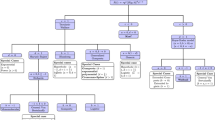Abstract
Based on a lot of data-analyses from different areas including also scientometrics (Mathematical publications) a new method for description of growth indicators in highly aggregated societal systems is proposed based on the sigmoid EVOLON growth model and its degenerated forms which together include most of the until now used growth curves in different fields. For these models simulation procedures are described which give us options for the parameter identification. Beside these possibilities closed analytical formulas are derived for all the parameters which make use of higher derivatives of the sequence of measured values of the considered growth indicator. With this possibility the identification problem is used for the construction of reliable estimators for derivatives up to some order from measured sequences of growth indicator values. At the end of paper a certain view is thrown on new possibilities for the construction of networks for coupled growth processes offerring also identification possibilities.
Similar content being viewed by others
References
M. PESCHEL, W. MENDE,Predator-Prey Models-Do We Live in a Volterra World? Akademie-Verlag Berlin and Springer-Verlag Vienna 1986.
M. SAVAGEAU,Biochemical System Analysis, Addison-Wesley Publishing Company, 1976.
M. PESCHEL, W. MENDE, F. BREITENECKER,Anwendung der diskreten Theorie ratengekoppelter Systeme in der Regelungstechnik, Berlin, 30 (1987) 7, p. 322–324.
M. PESCHEL, M. VOIGT, W. MENDE, F. BREITENECKER, Modellbildungsrahmen von Zeitreihen als Grundlage für die Simulation dynamischer Systeme, Berlin, 31 (1988) 3, p. 126–128.
M. PESCHEL, M. VOIGT, W. MENDE, F. BREITENECKER, P. KOPACEK, Nichtlineare Reglerkonzepte entsprechend der lokalen Modellierung der Theorie ratengekoppelter Systeme, Berlin, 31 (1988) 12, p. 558–559.
M. VOIGT,Evolution und Optimierung, Dissertation B. Academy of Sciences GDR, 1987.
W. MENDE, M. PESCHEL, Problems of fuzzy modelling, control and forecasting of time-series and some aspects of evolution. IFAC-Symposium on Control Mechanisms in Bio- and Ecosystems, Plenary Paper, Leipzig, 1977.
W. MENDE, M. PESCHEL, Structure-building Phenomena in System with Power Product Forces, In: H. HAKEN:Chaos and Order in Nature, Springer-Verlag, Berlin-Heidelberg-New York, 1981, p. 196–206.
M. PESCHEL, W. MENDE, Probleme der mathematischen Modellierung von Evolutionsprozessen, 24 (1981) 11, 602–606.
W. MENDE, M. PESCHEL, Strukturentwurf für instationäre und nichtlineare Systeme, 10 24 (1981) 10, 581–583.
M. PESCHEL, W. MENDE, Parameteridentifikation von Potenzprodukt-Triebkraftmodellen, 25 (1982) 5, 255–257.
Author information
Authors and Affiliations
Rights and permissions
About this article
Cite this article
Peschel, M., Mende, W. & Albrecht, K.F. The evolon growth model: Possible scientometrical evaluations. Scientometrics 18, 123–136 (1990). https://doi.org/10.1007/BF02019165
Received:
Issue Date:
DOI: https://doi.org/10.1007/BF02019165




